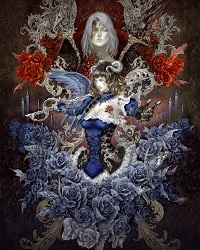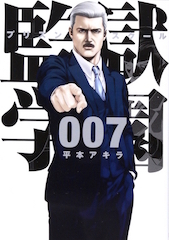Per ulteriori info sul media: https://store.cmpgam...Digital-Edition

Publisher - SquareEnix
Developer - SquareEnix Product Development Division 1
Release Date - jap=17/12/09 - US-PAL=9/3/2010
Platform - PS3/XBOX360
La serie Final Fantasy non è solo uno dei brand cardine di SquareEnix, ma rappresenta anche l'intero genere a cui appartiene, il JRPG.
In quanto tale e memore dei continui successi passati, il team di FF13 si fece carico della missione di creare un prodotto capace di vendere in tutto il mondo 5 milioni di copie. Del resto, sia FF7 che FFX, entrambi primi esponenti della serie delle 2 generazioni passate, esattamente come 13 lo è dell'attuale generazione, sono conosciuti per aver settato nuovi standard, non solo nell'ambito jrpg, ma anche in termni di grafica, gameplaye e storia.
Con queste importanti aspettative, l'obbiettivo di FF13 era quello di creare qualcosa che avrebbe avuto un impatto simile in termini di tecnologia e gameplay.
Il progetto era finalizzato a creare un capitolo degno delle aspettative che ogni FF ha sempre suscitato nel pubblico. Un concetto astratto si potrebbe affermare, ma per realizzare un tale pensiero, che lascia molte interpretazioni, il team si è arrovellato molto durante la fase di sviluppo.
Con l'avvento della PS3, il team decise di spostare il progetto dalla PS2 alla nuova e futura console, esattamente nello stesso momento in cui la compagnia dovette crearsi il nuovo motore grafico per la next-gen. Dopo una iniziale tribulazione, si scelse di adottare un custom engine per lo sfruttamento a lungo termine. Il passaggio del progetto ad un'altra console portò inevitabilmente a tutta una serie di cambiamenti ma, nonostante questo, lo scenario e la direzione intrappresa per il nuovo capitolo della serie non andò troppo lontano da quello che fu originariamente immaginato su PS2.
La nuova strategia di sviluppo fu una semplice estensione delle tradizionali pratiche interne alla compagnia, con team focalizzati su specifici campi a seconda delle loro competenze.
immagini della versione preliminare per PS2
A questo postmortem partecipano Motomu Toriyama, director e scenario writer (event planner in FF7, event director in FFX e director in FFX2) e Akihiko Maeda del project investment managment division (non nuovo ai postmortem di SE e event planner in FF9).
La struttura del postmortem è semplice: punti chiave dello sviluppo vengono elencati in due insiemi, quello che non funzionò e quello che andò bene.
Cosa andò storto
Lack Of A Shared Vision
Although the game was announced with an elaborate trailer, the team had little direction beyond this proof of concept, which led to problems as development ramped up.Final Fantasy XIII was first introduced through a concept trailer shown alongside the announcement of the Fabula Nova Crystallis project at E3 2006 (Fabula Nova Crystallis represents a suite of games and other entertainment media related to Final Fantasy XIII). The trailer was merely a visual concept, and we had not yet created anything playable at that point.
I felt that this trailer set the bar for the quality we were aiming to achieve, in terms of battle speed and cutscene imagery, and believed that this sentiment was shared by the rest of the team.
However, it became clear that, at the time, there were actually very few members who saw the trailer as a representation of what we wanted to achieve with Final Fantasy XIII. This lack of a shared vision became the root of many conflicts that arose later in development.
in breve: il trailer dell'E32006 era solo un visual concept e niente del gioco vero e proprio esisteva al tempo. Ma il team di sviluppo non era unito sulla visione generale di quello che FFXIII sarebbe dovuto essere; non per tutti il video rappresentava il futuro del gioco.
il trailer originale:Spoiler
The Universal Engine And Narrowing Down The Specs
In addition to developing the game, the team was also working on Square-Enix's multiplatform engine Crystal Tools, which added an extra layer of complexity to an already demanding project.
Another issue was the universal engine. Because we were so focused on creating an engine for next-gen hardware that could be utilized across all platforms, we made the mistake of trying to accommodate every single project that was in progress at the time.
In hindsight, it should have been obvious that it would be impossible to fully satisfy all of these needs. As a result, we spent a considerable amount of time prioritizing all the different requests and ended up not being able to determine the final spec requirements.
This created a standstill between the engine and game development teams, because if the engine’s specs couldn’t be finalized, neither could the game’s. As the debates continued without resolution, the timetable was also affected.
in breve: per lo sviluppo del nuovo engine vi furono vari progetti portati avanti parallelamente. Lo sbaglio fu quello di accomodare ogni progetto e questo impedì la realizzazione di un solo engine dalle specifiche concrete in tempo brevi. Se le specifiche del "motore" non venivano ultimate, neanche lo sviluppo del gioco poteva partire.
Getting started anyway
As all of this was going on, the staff involved directly with the actual data construction had no choice but to start working before the specs were finalized. Their main concern was that they could not be able to keep up with the schedule if they continued to wait for final decisions. After calculating the estimated total data volume from the umpolished script and key learnings from past projects, the team felt a steandy increase in staff was necessary. Whit the expansion of the team, lines of communication became muddled, and even after the specs were finalized, we had to backtrack. In some cases, the data created could not even be used. Not only this a waste of time, it olso drecreased the team's motivation.
in breve: il team di sviluppo incominciò a lavorare nonostante l'engine non era ancora ultimato, ma tutto si reggeva su basi fragili e non finalizzate. Ci si rese subito conto che occorreva un team più grande, ma l'arrivo del nuovo personale rese la comunicazione ancora più confusionaria e ad engine ultimato si dovette ritrocedere sullo sviluppo del gioco.
The limits of the traditional team structure
As the project's scope increased, the traditional development style of dividing the team into specified roles, such as character modelers or texture artists, started to present issues as well. This problem of over-specialization presented itself in each discipline. The biggest problem was that the project became bloated with the increase in staff within each department. And because roles were so specific, the communication flow became faulty and information was not being shared properly. One specific example was the updates or confirmations regarding specs would not get through to very team menber, and at times, the staff would continue to create data without knowing the most up-to-save status.
Departments that communicated very closely would actively share information, so there were no problems ther, but these cases were based strincly on individual communication skills. For example, when we looked collectively at our in-game locations, which are basically what each level of the game could bebroken down into, there were instances where what the artist and game designer had initially agreed upon would somehow shoft due to the effects of another section's progress; and it was apparent that information was not being trasferred properly.
In the past, we had always created graphical assets that were presentable from all angles, so that they coul be adapted from any situation. During development, there was a unspoken sule of craft everithing in fulll detail. However, in transitioning to modern consoles, the limit to detail became too bottomless, infinitely increasing the wotkload to create each asset. As a result, some team mombers would exhaust their energy by crafting a fully detailed asset that would only appear for a split second in the actual game.
in breve: la tradizionale struttura di sviluppo interna alla compagnia, ovvero dividere i team in ruoli specifici, mostrò i suoi limiti e creò seri problemi. Le informazioni non giravano adeguatamente da un team all'altro e capitava che si creasse data senza conoscere lo stato dei lavori altrui.
International Player Tests That Came Too Late
Even before the current generation of consoles was introduced, it was obvious that the game market in the West was gaining momentum, and we couldn’t ignore it. The sentiment that stood out the most to us at the time was the increasingly harsh criticism towards JRPGs.
Linearity and command-based battles were two of the features being perceived negatively. This was something that the team was very conscious about, and there were concerns about whether JRPGs would still be accepted in the West. Because Final Fantasy XIII’s mission was to succeed worldwide, we could not ignore this issue, as we felt it could deeply affect the future of the franchise.
Around the same time, we were experimenting with Western development methods, and there were talks within the team of global focus groups, which we had rarely conducted with previous projects.
At the same time, Square Enix set up international focus groups for certain titles, including Final Fantasy XIII. Unfortunately, we were already quite far along in development, and knew it would be too late to implement most of the feedback from the player test sessions. Even so, we still signed up for the opportunity, as this would be our only chance before the game’s release to see how Western players would respond to all that we had been working on.
There were some minor hiccups, as we did not have much time to prepare for the focus group sessions, but we were able to successfully conduct player tests and interviews globally. Even though it was too late to apply the majority of the feedback, most team members felt the tests were worthwhile, as it gave them insight into what players wanted globally.
With the changes that were being considered, because of the lack of a clear communication line, the development team was not receiving clear instructions. This resulted in conflicts within the team on whether it was worth forcing certain changes into an already tight schedule.
in breve: l'importanza del mercato occidentale incominciava a farsi seriamente sentire e negli studi di sviluppo si percepiva che il JRPG in occidente non era più ben considerato, soprattutto a causa della -linearità- e dei -sistemi a turni-. Questo calo di popolarità verso il genere non poteva essere ignorato, considerando soprattutto che la missione del nuovo FF era quella di sfondare in tutto il mondo.
In quel periodo, SE formò degli international focus grous per alcuni suoi progetti, FF13 incluso. Sfortunatamente lo sviluppo del gioco era già in fase avanzata e molti dei feedback, frutto dei player tests, che avrebbro potuto migliorare il gioco non hanno trovato implementazione del progetto.
Alcuni cambiamento però vennero considerati ma, a causa della poca comunicazione, non vennero date precise istruzioni ai team e si vennero a creare attriti interni.
Cosa invece andò nel verso giusto
A causa di questa mancanza di comunicazione interna e della fiducia su metodi di sviluppo vecchi e ferragginosi, il progetto dovette fronteggiare diverse difficoltà. Fortunatamente i problemi vennero superati grazie ai seguenti metodi e all'introduzione di nuove vie.
Realizing A Shared Vision Through The Demo
Even at a late stage of development, we did not agree on key elements of the game, which stemmed from the lack of a cohesive vision, the lack of finalized specs, and the remaining problems with communication between departments.
What enabled us to conquer this line of seemingly endless conflicts was the development process for the Final Fantasy XIII demo, which was included in theJapan-only Blu-ray version of the animated film Final Fantasy VII: Advent Children Complete. The demo was not in our original plan, so we had to make adjustments to the overall schedule to accommodate it. Whatever effects creating the demo had on the schedule, once it was complete we realized it was just the panacea we needed.
With a tangible version of the game that could actually be played, internal debates transitioned from theoretical discussions based solely on abstract concepts to concrete dialogue. The demo not only unified the vision and understanding of the game’s direction across the entire development team, but it was also the first time that everyone could see exactly how the assets they worked on would function within the game. During the internal postmortem, many team members noted that the demo was what finally allowed them to truly realize and embrace the vision for Final Fantasy XIII.
Although a vertical slice is commonplace in Western development, this was never actually practiced with our teams unless there was a company requirement. In retrospect, the demo acted as our vertical slice, and its effectiveness was felt full force by each and every member of the team. This was an essential key learning point that affected how we approached game development moving forward.
in breve: molti dei problemi di coesione tra team persistevano anche a sviluppo inoltrato e ancora non c'era una visione unica e condivisa su quello che il gioco doveva essere. Lo stallo venne apparentemente risolto grazie allo sviluppo della demo, non prevista originariamente, inclusa del bluray di Advent Children. Lo sviluppo della demo obbligò i team ad una migliore integrazione e ottimizzazione ed ebbe l'effetto rigenerante di una panacea. Con una versione finalmente tangibile e concreta del gioco, i team riuscirono a unificare le loro visioni su quello che FF13 era.
Clarification Of Elements And Processes Through Developing The Demo
The demo brought together all data, development of which was previously uncoordinated, clarifying many elements and significantly speeding up the process of determining the remaining specs.
Instead of crafting fully detailed assets that looked good from every angle, the team could gauge how much effort to put into each area of the project by keeping in mind exactly how the asset would be used in the game. This realization had an increase in the team’s ability to assess priorities, and as a result, productivity increased as well. With a much better understanding of the overall workload, we increased our ability to construct highly efficient schedules; the new scheduling was so effective, we actually did not miss a milestone.
in breve: grazie alla demo si riuscì ad avere una chiara visione dell'insieme e questa realizzazione persime una migliore ottimizzazione dei team e delle loro abilità. La produttività ne guadagò.
Create the location manager role
Although the schedule was now working, we began to realize that we were unable to keep up with the sharing of information within the traditional team structure. On order to resolve the issue, we created a new role that did not exist in our traditional development environment the location manager, who would function to bridge the gap between different departments. The location managers were put in charge of specific in-game locations, overseeing and making adjustments to everything from cutscenes to battle placement; their position was similar to that of the lead level designer. Not only did the information flow improve on a location-based level, team menbers looking to lead project in the future were able to hone their skills. The process relied heavily on the skills of individual location managers, so there were definitely ups and downs in the quality of the end results. Also, because these managers did not have discretionary authority, at times they were hindered because they could not make decisions on the spot. There in so doubt, however, that location manager role had a positive affect in the project overall.
in breve: nonostante il progetto incominciò ad ingranare, la mancaza comunicazione tra i team persisteva e per risolvere alla radice il problema venne "creato" il Location Manager. Un nuovo ruolo che faceva da ponte tra i buchi comunicativi da un dipartimento e l'altro. Posizione simile al Lead Level Designer, il location manager supervisionava e "aggiustava" un po' tutto, dalle cut scene alla dislogazione delle battaglie. Quello che non poteva vantare era l'autorità a propria discrezione e pertanto a volte il suo operato veniva intralciato dall'impossibilità di prendere decisioni in loco.
Resolving the universal engine dilemma
The issue with the universal engine was seen as something that would affect the progress of all related projects within the company, and in the end, it was decided that the needs of the flagship title, Final Fantasy XIII should come first and foremost. Once this was settled, the poject and tool development teams were able to work very closely, and it became much easier to determinate the specs on the project-side of things. Tool development began to pick up pace around the time when the game's core engine was around 70% complete.
Narrowing down polishing points through focus groups
Through the focus group we conducted (mentioned in the "wrong" section), we found that, contrary to expectations, the game was received very well by Western players. Also, both Japanese and Western players place emphasis on the story and battles, meaning that the style we focused on with Final Fantasy XIII was accepted after all. With this, we gained confidence that the game could stand its ground overseas as well. Now that the development team had obtained knowledge based on actual players response, the desire and motivation to modify the game increased.
Up until this point, development had been based solely on personal views of what was right or what was perceived ad commond knowledge.
Because it seemed that Western players were extremely conscious of the moment-to-moment experience in battles, the feedback and requests we received regarding the system were brought to the staff's attention as important polishing points, and were incorporate in the final product as much as was possible.
We gained a considerable amount of knowledge from tests, and in the end, most of the team felt that, while things did not go perfectly, it was wothwhile. This experience led to discussions of how the knowledge gained could be utilized effectively for future projects.
in breve: prima di arrivare ai Focus Group, lo sviluppo del gioco poggiava su quello che gli sviluppatori percepivano fosse giusto o sbagliato ..... I Focus Group però mostrarono non solo che il gioco era ben accolto anche in occidente, ma enfatizzarono molto storia e battle system, e questo fu un grosso feedback per gli sviluppatori. Grazie a questa risposta positiva da parte dei giocatori, il morale dentro gli studi di sviluppo aumentò. I feedback dall'occidente furono utili per ripulire certi punti e certe richieste furono incorporate nell'opera nei limiti del possibile. Alla fine molti dei team affermarono che pur non essendo andato tutto nel migliore dei modi, i Focus Group ne valsero la pena.
What changed the project?
Guardando indietro, molti problemi risaltano dallo sviluppo di FF13. Le informazioni non venivano adeguatamente condivise, c'era mancanza di comunicazione, le specifiche dell'engine non erano chiare, il concept stesso del gioco non era chiaro. Questi furono i maggiori problemi che afflissero lo sviluppo. Si potrebbe pensare che l'ovvia soluzione a tutto questo potrebbe essere pianificare meeting, standardizzare il workflow, chiarificare la struttura dei team e i canali di comunicazione e richiedere costantemente documentazioni su tutto. Ma queste azioni avrebbero risolto tutti i problemi? Forse temporaneamente, ma di certo non puntano al nocciolo del problema.
Risolvere i grattacapi dell'engine e creare il Location Manager furono certamente d'aiuto, ma quello che diede una sferzata decisiva alla situazione fu la creazione di una ROM tangibile, una demo da vedere e giocare. Nonostante si trattasse solo di una piccola porzione del gioco, è grazie alla consapevolezza di essere riusciti a creare un qualcosa di qualitattivamente definitivo che si riuscì a superare le difficoltà di quelle comunicazioni parziali basate su teorie e concetti presenti solo nelle teste dei designer. Finalmente, tutti i membri dei team potevano discutere su materiale concreto. Finalmete tutti erano sulla stessa linea d'onda ed era chiaro quale era il traguardo da raggiungere. Un po' tardi nello sviluppo, ma si è sperimentato sulla prorpia pelle l'importanza di un "prototipo" durante lo sviluppo di un prodotto.
testo originale del pezzo
Fantasy Forward
FFXIII overcame nomerous difficulties on it way to becoming a finished product. Development following the trial version was extremely smooth, especially in the final year of the project, during which we were able to save a lot of time by localizing the overseas versions as the Japanese version was being completed.
The character animations that portray detailed emotion, the high-definition visuals with beautifully vivid scenary, the speedy battle system, and the gripping storyline were all very well received worldwide, with the sales figures in Japan and overseas on just about equal standing. The lastes update is that we have shipped over 5.8 million globally, marking this project as a great success.
The conclusion to the postmortem is very simple. I learned that we must first create something tangible and playable to share a game's concept and confirm the actual specifications to create an environment in which precise decisions function within the process. Only then can you proceed with the development of such immense amounts of data. Furthermore, up until this point, we had taken a very traditionally Japanese "Square Enix method" based on individual craftsmanship. Now we are trying to incorporate as much as possible form the development style of studios overseas into our system.
in breve: il metono di sviluppo utilizzato fino ad ora in Square Enix non è più una garanzia e quindi verranno incorporati metodi soliti degli studi occidentali.
ps: le parti in italiano non in italic sono state tradotte dai pezzi originali ma, non essendo io un traduttore, se trovate inesattezze segnalate pure. Alcuni pezzi in inglese sono stati copiati a mano dall'articolo, quindi potrebbero contenere errori di battitura.

 Connettiti
Connettiti Registrati subito
Registrati subito





 Torna su
Torna su














